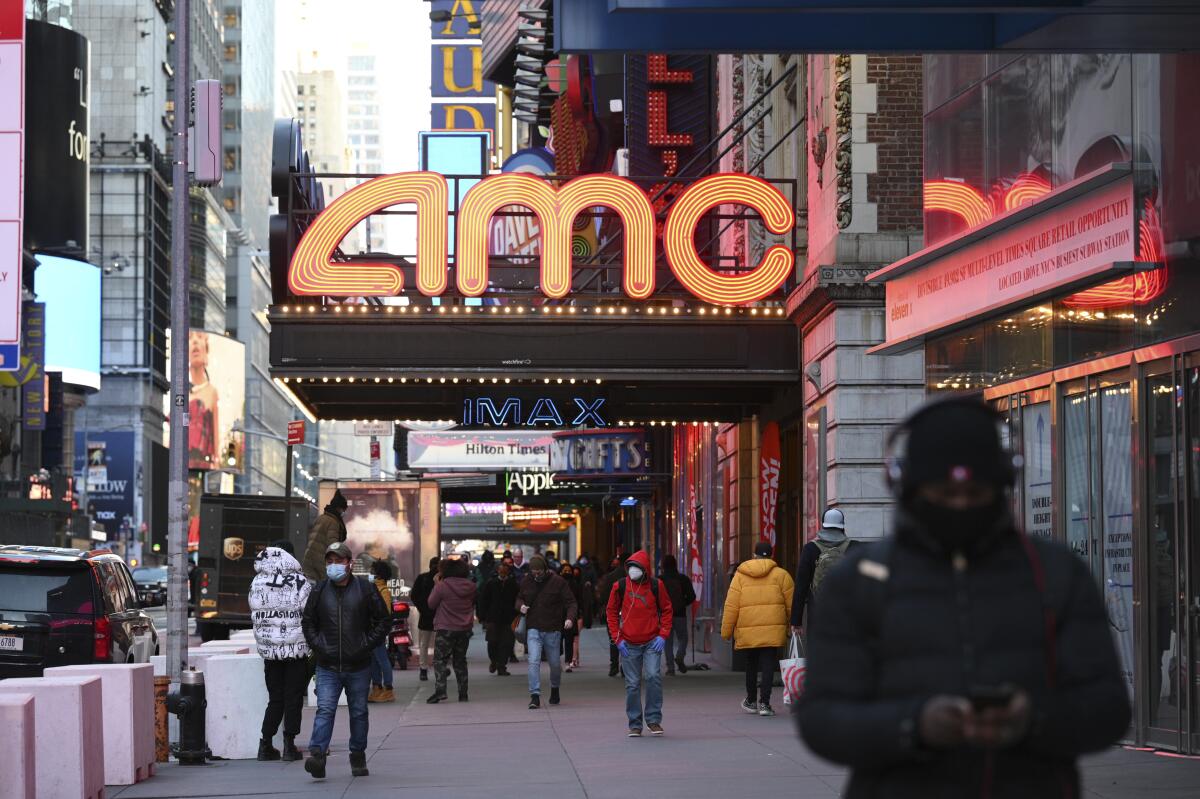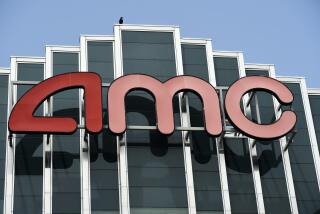AMC takes traders on a wild ride and pockets $587 million in cash

AMC Entertainment Holdings Inc. dizzied investors Thursday by losing 40% of its market value, then regaining more than half of that — and pocketing more than $587 million in fresh cash by exploiting the frenzy.
The stock’s wild rally of 2021 initially collapsed Thursday when the company disclosed plans to sell more shares and use the money to cut its heavy debts. AMC went ahead with the sale anyway, ultimately collecting $587 million by midday, and any concern among investors that their holdings would be watered down faded after AMC said it completed the program.
After briefly erasing all of their losses, the shares closed down 18% at $51.34. The decline continued in after-hours trading, with the stock falling as much as 11%.
AMC’s Adam Aron loves quoting Winston Churchill in earnings calls. Now he’s embracing the company’s memestock identity.
It’s just another remarkable turn of events for the movie theater chain, which was staring at potential bankruptcy only a few months ago in the face of the COVID-19 pandemic and brutal competition from streaming services. Amid the mania for meme stocks, shareholders have brushed aside doubts about the wisdom of bidding up a company’s stock by about 3,000% when its survival was so recently in doubt, and they reserved extra contempt for Wall Street professionals.
“As crazy as today’s action might seem, it’s a lot more normal than the action the stock has seen over the previous seven trading days,” said Matt Maley, chief strategist at Miller Tabak & Co. After all, he said, it’s not unusual to see a stock back off after such an outsized rally. “Nothing that has taken place over the past two weeks should be considered normal, until today,” he said.
Analysts such as Chad Beynon at Macquarie aren’t backing off from predictions of a bigger plunge to come.
“Based on what we’ve seen with other retail stocks, and given the paper profits from these retail investors, we would expect for shares to fade,” Beynon said. “Fundamentally, we still believe that AMC is worth $6.”
Credit investors, by contrast, pushed bond prices higher because even at the newly depressed price, the share sale was making a sizable dent in AMC’s crushing pile of debt, which stands at about $5 billion.
“It would be irresponsible for the board and management to not do a raise to secure the balance sheet at these levels,” said Greg Taylor, chief investment officer at Purpose Investments. CreditSights analysts Matt Zloto and Hunter Martin wrote that a successful offering “would be a massive first step in deleveraging the AMC capital structure.”
The Thursday morning filing for the equity sale came just days after AMC collected $230.5 million by selling stock to Mudrick Capital Management. The investment firm then flipped those shares, selling for a profit as it told clients that AMC was overvalued.
AMC warned investors flat out that they could see their stakes diluted and perhaps suffer heavy losses after the new offering, which was designed to be sold in the open market where retail traders thrive. Stocks sold in traditional offerings are purchased mostly by institutional investors.
“I would have told them to cash out the last time this happened,” said Barry Schwartz, chief investment officer at Baskin Financial Services. “In the dot-com boom it continued until everyone lost all their money and took the whole stock market down with it.”
Redditors have sent AMC’s stock on a wild ride since the GameStop saga exploded in January.
The frenzied rally has pushed shares in the money-losing business to improbably high levels, giving the movie-theater company a market capitalization this week that was bigger than half of the listings in the Standard & Poor’s 500 index. “AMC to the Moon” posters have popped up at street corners and pool parties in the U.S. amid the reality-defying surge for AMC and other meme stocks.
But among AMC’s army of retail investors, signs of fatigue emerged Thursday amid temptation to book some of the outsized profits, and the share sale touched a raw nerve that had triggered a stockholder rebellion earlier this year. AMC had sought to authorize 500 million new shares, but withdrew the plan in April amid objections from shareholders worried about getting diluted.
Still, the company said at the time that it was likely to revisit the idea “at some point in the future.” Back then, the stock was selling for less than $12 a share. At current prices, a similar offering could wipe out the company’s entire debt load of about $5 billion several times over and reap additional billions of dollars to fund AMC’s turnaround.
Now, AMC is making a renewed push. Late Thursday, the company filed a preliminary proxy seeking permission to sell 25 million shares in 2022. Chief Executive Adam Aron told shareholders in the statement that AMC may face challenges or “exciting opportunities” post-pandemic and needs “precious shares” to issue if such a situation arises. It also dismissed speculation of a stock split.
AMC’s bonds were among the top gainers in the U.S. high-yield market Thursday, setting fresh highs. Its second-lien notes due 2026 rose 3.25 cents on the dollar, vaulting them over face value at 100.75 cents, according to Trace trading data.
The company “had an unsustainable debt level and is chipping away by issuing equity,” Michael Pachter of Wedbush Securities said in an email. “I think that’s smart to ensure that they remain healthy so they can thrive as things return to normal.”
More to Read
Inside the business of entertainment
The Wide Shot brings you news, analysis and insights on everything from streaming wars to production — and what it all means for the future.
You may occasionally receive promotional content from the Los Angeles Times.











